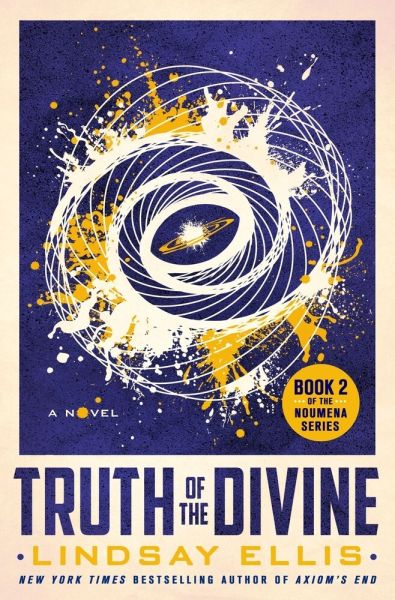For Something Pure and True
Truth of the Divine (Noumena, volume 2)
By Lindsay Ellis

28 Sep, 2021
0 comments
2021’s Truth of the Divine is the second volume in Lindsay Ellis’s Noumena alternate history first contact series.
Aliens — in the form of a handful of anti-social political refugees equipped with technology far superior to ours — have fled to Earth and US bureaucracy has tried to adapt to new needs. Cora Sabino is one of those adaptations. One of very few humans with whom the aliens will deign to speak, she has a full-time job mediating between the aliens and the US’s various alphabet soup agencies. On the one hand, it’s a secure job in economically troubled times. On the other hand, Cora has to deal with post-traumatic stress disorder (complicated by her mental link with one particular alien). She also has to cope with US security agencies, which are often staffed by … um … difficult people.
Her already fraught existence is complicated by the rise of the Third Party.
The Third Party claims to be neither Republican nor Democratic. While it is in fact a third party, its name references its signature policy. Alien refugees on Earth aren’t to be given full human rights; they’re to be given a smaller set of rights. This is the Third Option (neither full acceptance nor deportation, but a grey area in between) that gives the party its name. The aliens aren’t even separate but equal; they’re separate.
The Third Party claims that this must be done to protect the Earth from technologically superior aliens [1]. Cynics might wonder if the true motivation behind the Third Option is to establish that some sentients can be given only limited rights; when that’s accepted, the policy can be extended to disfavored human groups.
In the previous book, the alien dubbed Ampersand formed a mental bond with Cora for reasons that seemed good at the time. The bond is functionally akin to telepathy, though it doesn’t extend to reading thoughts. What leaks across this bond are emotional states. Given that the two come from different species and cultures, this sustained contact is incredibly stressful for both entities.
Complicating the relationship: Ampersand feels affection for Cora but that does not mean that he sees her as an equal. In condescending fashion, he habitually conceals alarming facts from her (at least for a time). A terrifying revelation undermines trust at just the wrong time, as the pair try to survive personal and political crises of potentially Earth-shattering scale.
~oOo~
This is one of those works, like Akira, where a surprising amount of the book involves racing from one place to another. Motion is not the same thing as plot.
Cora’s father Nils is lurking around the edges of the plot and is just as much a piece of work in this book as he was in the first one. He is one more element in the mess of abusive relationships which provide the framework for the novel’s plot. Such as it is.
While humans were aware that the Pequod (as the US designates Ampersand’s civilization) are potentially a significant threat, humans had assumed that any information about the Earth would take a long, long time to reach the centre of Pequod activity, which is all of a hundred light years away. Any Pequod response would take a long, long time to reach us. This is not the case. The aliens have agents spread throughout this part of the Milky Way, linked by superluminal communication [1]. Bad luck for humans.
Now you might be wondering why aliens who could have billion-year years head start have technology that, compared to human tech, is only far superior and not outright godlike. We learn that it’s because the aliens have kneecapped themselves. They believe in genetic and social purity. Any innovation could be seen as an unforgivable deviation from the true way and end in death for researchers and all their kin. If you’ve been looking for a novel that disses eugenics, here you go.
In many SF novels, alien flaws would lead to a proclamation of human superiority. In this book, the author makes it clear that humans have their own crippling flaws. Disfunction all round, which is rather sad.
Relationships in this work appear to be come in two flavours — abusive or doomed. Mass extinction may be the least bad outcome for all.
In sum: this book is competently written but depressing on essentially every level. Humanity will likely die at Pequod hands. So will the Pequod, as they perfect themselves into extinction. Both groups seem to deserve what’s coming. As for the protagonist: Cora’s personal relationships are also disastrous; she is given to contemplating self-harm. Nevertheless, the characters, despite having been dealt terrible hands, do their best to prevail in the short term, even though this seems utterly pointless in the long run. Which I guess is if not heartening, is at least heartening adjacent? At least to people who are depressed.
I am not convinced this series is headed anywhere I care to follow, but I’ve read two thirds of the series so I guess I will have to ride it out to the end.
Truth of the Divine is available here (Amazon US), here (Amazon Canada), here (Amazon UK), here (Barnes & Noble), here (Book Depository), and here (Chapters-Indigo).
1: You may ask “how exactly does it make any sense to treat a group of arrogant, touchy aliens known to be armed with weapons beyond human ken as second-rate persons? Hasn’t it occurred to any of the humans that the aliens, if provoked, could exterminate our species without too much trouble?” Look over there! The Winged Victory of Samothrace!
2: The aliens have the tech for relativistic starflight. If they also have the tech for faster-than-light communication … well, there’s the possibility that this will make for causal violations.
